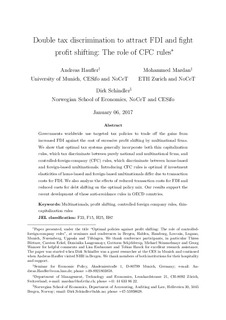| dc.contributor.author | Haufler, Andreas | |
| dc.contributor.author | Mardan, Mohammed | |
| dc.contributor.author | Schindler, Dirk | |
| dc.date.accessioned | 2017-04-24T12:11:26Z | |
| dc.date.available | 2017-04-24T12:11:26Z | |
| dc.date.issued | 2017 | |
| dc.identifier.issn | 2464-4005 | |
| dc.identifier.uri | http://hdl.handle.net/11250/2440536 | |
| dc.description.abstract | Governments worldwide use targeted tax policies to trade off the gains from
increased FDI against the cost of excessive profit shifting by multinational firms.
We show that optimal tax systems generally incorporate both thin capitalization
rules, which tax discriminate between purely national and multinational firms, and
controlled-foreign-company (CFC) rules, which discriminate between home-based
and foreign-based multinationals. Introducing CFC rules is optimal if investment
elasticities of home-based and foreign-based multinationals differ due to transaction
costs for FDI. We also analyze the effects of reduced transaction costs for FDI and
reduced costs for debt shifting on the optimal policy mix. Our results support the
recent development of these anti-avoidance rules in OECD countries. | nb_NO |
| dc.language.iso | eng | nb_NO |
| dc.publisher | NHH | nb_NO |
| dc.relation.ispartofseries | Working papers;2017/01 | |
| dc.subject | multinationals | nb_NO |
| dc.subject | profit shifting | nb_NO |
| dc.subject | controlled foreign company rules | nb_NO |
| dc.subject | thin-capitalization rules | nb_NO |
| dc.title | Double tax discrimination to attract FDI and fight profit shifting: The role of CFC rules | nb_NO |
| dc.type | Working paper | nb_NO |
